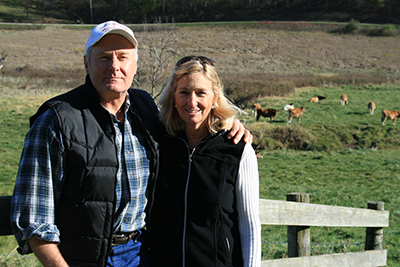
Dick and Kim Cates operate Cates Family Farm, a grass-fed beef enterprise that included, at its height, 700 acres of managed grazing land and 200 acres of managed forest. They direct-market their pasture-raised steers to grocery stores, restaurants, cafeterias and households around southern Wisconsin and Chicago.
Since 1987, the Cates have worked to make the family farm more environmentally sound and profitable. They adopted rotational grazing practices and created a managed grazing system, added subdivision fencing and created stream crossings for livestock. They encourage the revitalization of a native oak savanna and care for Lowery Creek, a Class 2 trout stream that runs through the grazing acreage. The stream supports a healthy population of native brown and brook trout and introduced rainbow trout.
Dick’s passion for land conservation and environmental improvement led to his involvement in planning the first Wisconsin grazing workshop in 1990, which grew into the state grazing conference, one of the premier grazing events in the Midwest.Dick is Senior Lecturer in the Dept. of Soil Science at the University of Wisconsin – Madison and Director of the UW Center for Integrated Agricultural Systems – Wisconsin School for Beginning Dairy & Livestock Farmers where he has mentored students for twenty years.“For me, conservation became not just a set of constraints, but a very positive part of my life that involved skill and learning to understand what the land could handle,” he said. “So I encourage the young farmers I’ve been training to look at that piece of land as your portrait and a statement of yourself, and try to understand how you and the land together as partners can do better. And that’s an uplifting way to farm. I think all of us want to do that, it’s a process of finding our way.”Dick and Kim love and respect the land and have this community sense about them,” wrote UW Extension Grazing Specialist Rhonda Gildersleeve in a nomination letter. “They have found the middle ground where a profitable farming system can co-exist with excellent conservation and positive environmental impacts.”
 Sign In
Sign In
 Sign In
Sign In
